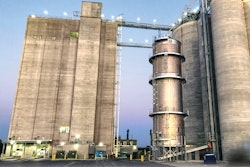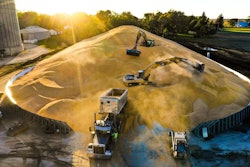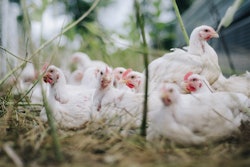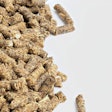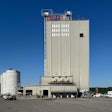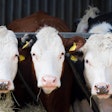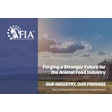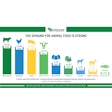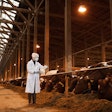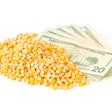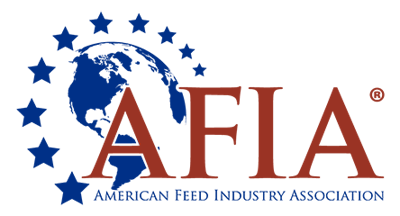
In December 2018, after 48 years of service to the agriculture and food industries, Joel G. Newman, president and CEO of the American Feed Industry Association, announced he would be retiring in December 2019. Newman led AFIA for 15 years and served as president of IFEEDER (the Institute for Feed Education and Research), the association’s 501(c)(3) public charity, since its inception in 2009.
Newman previously held executive positions at Agway, Inc., Maple Leaf Foods, Inc. and United Cooperative Farmers after receiving his MBA in finance and marketing from Syracuse University and a bachelor’s in animal science from West Virginia University.
When Newman landed at AFIA in the early 2000s, he helped usher in a new era of changes for the association, including developing a strategic focus that better aligned it to meet the future needs of the changing industry it served.
His vision led to the creation of AFIA’s Four Promises of Member Value and expanded the AFIA staff to involve top talent who could provide legislative and regulatory representation and member access to invaluable expertise. Newman also prioritized the expansion of AFIA’s education programs and networking events during his tenure.
But he wasn’t solely focused on the internal workings of the association. Newman also looked outward and expanded AFIA’s global focus on the development of international food safety standards and opening more international trade opportunities for the industry.
Additionally, he represented the U.S. animal feed industry on the International Feed Industry Federation’s Board of Directors, previously as IFIF’s chairman and as a member of the U.S. delegation to the Codex Alimentarius.
Certainly, with nearly five decades of experience under his belt serving the U.S. feed industry in various capacities, he will be sorely missed. But before closing this chapter in his history book, Newman sat down with Feed & Grain to share some of his reflections, insights and predictions for feed and agriculture.
Feed & Grain: How has the feed industry changed during your tenure with AFIA?
Joel Newman: Over the past 15 years, I’ve witnessed the animal food industry go through some monumental changes. From industry consolidation to advances in new technologies and ingredients to a continued focus on the interconnectedness of global trade, our industry is booming and continuing to discover new ways to not only serve our customers at home and abroad, but also to produce animal protein in a more
sustainable way.
One of the more interesting things to me has been how consumers’ attitudes toward food have shifted. Consumers are now playing a much more active role in their food purchasing decisions, asking more questions about food animals’ diets and calling upon food companies and national leaders to make policy decisions that impact animal protein production. In some cases, these calls for action have led to a restriction on the use of new technology and prevented affordable food from reaching the marketplace, which is why we have continued to work in concert with the broader agriculture and food chain, to tell our industry’s story of value and commitment to safe, wholesome and sustainable high quality food for consumers.
F&G: How has the association evolved and progressed throughout your career with AFIA?
JN: When I first came on board, we were implementing our protection against bovine spongiform encephalopathy — this became quite a success story. Traditionally, most contaminants in feed have been borne out of natural causes. But then we learned that some with ill intentions might purposely alter feed ingredients for personal monetary gain, as was the case with the spiking of gluten feed with melamine to reach protein standards. This was an important lesson learned in a new era and our industry acted, supporting the Foreign Supplier Verification requirement, included in the Food Safety Modernization Act (FSMA).
Of course, FSMA was the largest new regulation of the feed industry implemented since the 1950s. We represented the industry, working with Congress and the Food and Drug Administration, to ensure that the regulations made sense for our industry. Our public charity IFEEDER supported research that better defined the hazards reasonably likely to occur in feed and whether they required Current Good Manufacturing Practices (CGMPs) or preventive controls to mitigate. With the new rules in place, our staff and the industry had to ramp up efforts to learn the requirements and ensure our manufacturers had the tools they needed to do their jobs in compliance with the regulations.
We developed several resources for our members to train them on the requirements and implement them at their facilities. Now, some 10 years later, with all compliance deadlines for the two major types of FSMA inspections — CGMP and Hazard Analysis and Preventive Controls (HA/PC) — passing last September, most industry facilities are undergoing or preparing for federal inspections.
AFIA has also expanded its Safe Feed/Safe Food certification program for domestic animal food, pet food and internationally traded feed products. These certification programs have been updated to reflect FSMA’s requirements and are a great tool for facilities to use for FSMA inspections.
Amid FSMA, AFIA also contributed to the positive development of the Veterinary Feed Directive, which has played a role in the animal agriculture industry’s efforts to reduce and judiciously use antibiotics in food animals.
F&G: What do you view as the U.S. feed industry’s top challenge in the next five to 10 years and what do you see as its biggest opportunity?
JN: The industry will face several challenges in the years to come, but one that has been the most prevalent over the past couple of years has been how the interconnectedness of the global industry can be both a blessing and a curse.
From a market standpoint, our industry recognizes that expanding market access is the growth engine for the industry. The U.S. animal food industry sets the global “gold-standard” for manufacturing high-quality animal feed and pet food. Being able to export our products, technologies and efficient best practices will be essential in not only helping our industry thrive, but also in supporting countries that lack stable manufacturing processes, regulatory regimes or food safety practices in sustainably feeding their population.
We continue to urge the current administration to look for opportunities for negotiating trade agreements with key trading partners that puts America’s agricultural products first.
On the other side of the coin, however, we have learned that with the import and export of products, we open our borders up to foreign animal diseases that could have devastating impacts on the U.S. agriculture sector. Working together with producer groups, our nation’s leaders, foreign governments and associations, we have recognized the role we can play in protecting animal agriculture through increased biosecurity. An animal disease outbreak that happens in one species or area of the world ultimately impacts us all.
It’s important that our industry takes initiative now to learn lessons and deploy practices that can improve our biosecurity programs.
F&G: What are some of your career highlights during your time as AFIA’s president and CEO?
JN: One of my first actions as president and CEO of AFIA was to make sure that our members knew they were being heard and that our staff were focused on addressing industry priorities in an impactful way, as well as implementing efficient practices to better serve their changing and future needs. We instituted AFIA’s “Four Promises” – Voice, Representation, Expertise and Engagement – which continue today to be our guiding compass. Recognizing that our legislative and regulatory representation function was a “core” role, we continued to expand our small team to be a resource to members on the wide breadth of regulations that have hit our industry in recent years. With this focus on industry priorities and bringing member value, our association has consistently increased membership, member engagement in committees and member interest groups, participation at our conferences and have been able to expand our team expertise to meet the changing industry needs.
In 2009, we celebrated AFIA’s centennial — a remarkable feat — and launched our public charity, IFEEDER, which is now celebrating its 10th anniversary! IFEEDER has expanded in that time frame, filling the gap in research and education that our industry needs to communicate how regulations and other food policies can impact this unique animal agriculture sector to policymakers, regulators and consumer influencers. ■
Constance Cullman Named AFIA’s Next President and CEO
In May, the American Feed Industry Association’s Board of Directors selected Constance Cullman to succeed Joel G. Newman as president and CEO of the association and president of AFIA’s public charity, the Institute for Feed Education and Research.
Cullman officially started with AFIA in July 2019, while Newman assists with her transition into her new role this October.
Cullman most recently served as president and CEO of Farm Foundation for the past three years. Prior to that, she served as the U.S. government affairs leader for Dow AgroSciences; senior director of regulatory, technical and international affairs at the Corn Refiners Association; associate administrator for the U.S. Department of Agriculture’s Foreign Agricultural Service; vice president of agricultural ecology at the Ohio Farm Bureau Federation; and extension associate at The Ohio State University College of Food, Agricultural and Environmental Sciences.
“The selection committee made a great decision when they selected Constance Cullman as my successor,” Newman says. “Constance brings a track record of experiences and successes to AFIA. She is a visionary leader who will lead AFIA into the next era. In particular, her expertise and broader food industry connections will be an asset as AFIA further expands its focus in international trade, policymaker and consumer influencer communications, as well as legislative and regulatory impact. I head toward retirement knowing that AFIA is in good hands!”




